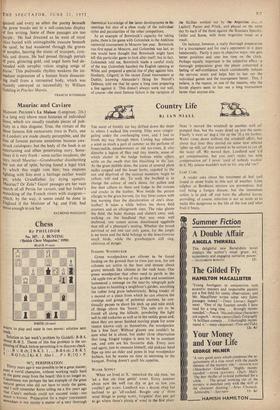Chess
By PHILIDOR
No. 107. J. BUNTING ('British Chess Magazine,' 1950) III ACK (9 men)
wHITE (10 men) WHITE to play and mate in two moves: solution next Week.
Solution to last week's problem by Guidelli: B-B 4, threat R-B 5. Theme of this fine problem is the un- Pinning of Black bishop permitting it to discover check.
• • • B x R ch; 2 B-K 3. I B-B 6 ch; 2 R-K 5. • • • B-Q 3 ch; 2 Kt-K 3. Also 1 P)< R;2Q x P.
99% PERSPIRATION
Thirty years ago it was possible to be a great master, even a world champion, without working really hard „„at the game away from the board: this is no longer so. ‘•-anablanca was perhaps the last example of the great natural genius who did not have to study the game, and I well remember Keres telling me a few years ago that Capa's methods could not succeed today—too Much is known. Preparation for a major tournament nowadays is not merely a matter of a very thorough theoretical knowledge of the latest developments in the openings but also of a close study of the individual styles and peculiarities of the other competitors.
As an example of Botwinnik's capacity for taking pains, there is his game with Golombek in the Alekhine memorial tournament in Moscow last year. Botwinnik was first equal at Moscow, and Golombek was last, so one would have thought that Botwinnik might have left this particular game to look after itself; but in fact, Golombek told me, Botwinnik made a careful study of the way Golombek handled the English opening as White and prepared a special line of play against him. Similarly, Gligorid in the recent Zonal tournament at Dublin, knowing Alexander's liking for Petroff's Defence, told me that he spent a long time preparing a line against it. This doesn't always work out well, of course—the most famous failure is the variation of
the Sicilian worked out by the Argentine
Lajdorf, Panno and Pilnik, and played on the same day by each of the three against the Russians SpassI4, Geller and Keres, with three Argentine losses as a result.
On balance, however, a really thorough preparation for a tournament and for one's opponents in it pays handsomely. Partly it pays in objective ways; one gets better positions and uses less time, on the clock. Perhaps equally important is the subjective effect--a thorough preparation gives the player concerned a feeling of self-confidence which considerably reduces the nervous strain and helps him to last out the individual games and the tournament better. This, I believe, is the reason, or one of the reasons, why the Soviet players seem to last out a long tournament better than anyone else.


































 Previous page
Previous page